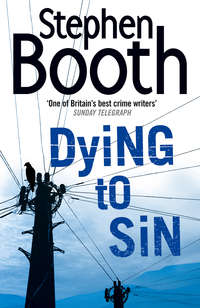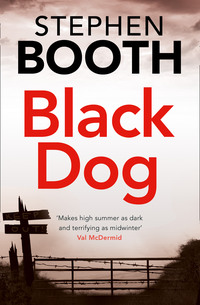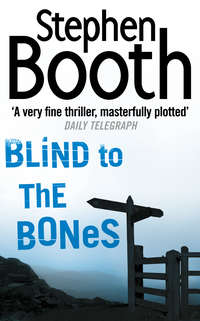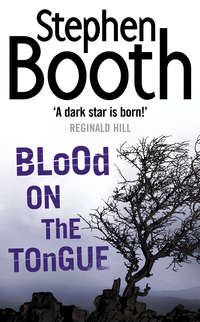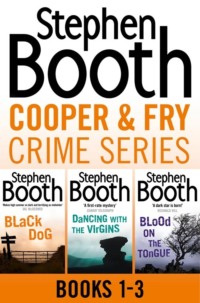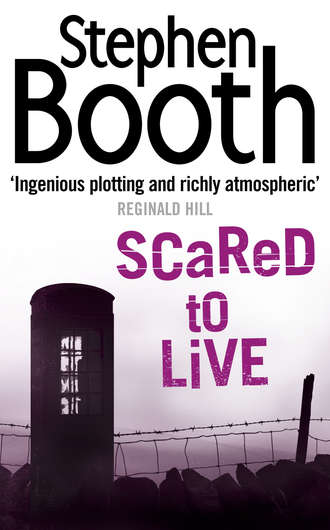
Полная версия
Scared to Live

STEPHEN BOOTH
Scared to Live

Copyright
This novel is entirely a work of fiction. The names, characters and incidents portrayed in it are the work of the author’s imagination. Any resemblance to actual persons, living or dead, events or localities is entirely coincidental.
Harper
An imprint of HarperCollinsPublishers Ltd. 1 London Bridge Street London SE1 9GF
www.harpercollins.co.uk
First published in Great Britain by HarperCollinsPublishers 2006
Copyright © Stephen Booth 2006
Stephen Booth asserts the moral right to be identified as the author of this work
A catalogue record for this book is available from the British Library
Set in Meridien by Palimpsest Book Production Limited Grangemouth, Stirlingshire
All rights reserved under International and Pan-American Copyright Conventions. By payment of the required fees, you have been granted the non-exclusive, non-transferable right to access and read the text of this ebook on-screen. No part of this text may be reproduced, transmitted, down-loaded, decompiled, reverse engineered, or stored in or introduced into any information storage and retrieval system, in any form or by any means, whether electronic or mechanical, now known or hereinafter invented, without the express written permission of HarperCollins ebooks
HarperCollinsPublishers has made every reasonable effort to ensure that any picture content and written content in this ebook has been included or removed in accordance with the contractual and technological constraints in operation at the time of publication
Source ISBN: 9780007172078
Ebook Edition © FEBRUARY 2009 ISBN: 9780007279692
Version: 2016-10-27
This book is dedicated to my parents, James and Edna Booth
Contents
Title Page Copyright Dedication Chapter One Chapter Two Chapter Three Chapter Four Chapter Five Chapter Six Chapter Seven Chapter Eight Chapter Nine Chapter Ten Chapter Eleven Chapter Twelve Chapter Thirteen Chapter Fourteen Chapter Fifteen Chapter Sixteen Chapter Seventeen Chapter Eighteen Chapter Nineteen Chapter Twenty Chapter Twenty–One Chapter Twenty–Two Chapter Twenty–Three Chapter Twenty–Four Chapter Twenty–Five Chapter Twenty–Six Chapter Twenty–Seven Chapter Twenty–Eight Chapter Twenty–Nine Chapter Thirty Chapter Thirty–One Chapter Thirty–Two Chapter Thirty–Three Chapter Thirty–Four Chapter Thirty–Five Chapter Thirty–Six Chapter Thirty–Seven Chapter Thirty–Eight Chapter Thirty–Nine Chapter Forty Keep Reading About the Author By the Same Author About the Publisher
1
Sunday, 23 October
Even on the night she died, Rose Shepherd couldn’t sleep. By the early hours of the morning, her bed was like a battleground – hot, violent, chaotic. Beneath her, the sheet was twisted into painful knots, the pillow hard and unyielding. Lack of sleep made her head ache, and her body had grown stiff with discomfort.
But sleeplessness was familiar to Miss Shepherd. She’d started to think of it as an old friend, because it was always with her. She often spent the hours of darkness waiting for the first bird to sing, watching for the greyness of dawn, when she knew there’d be people moving about in the village. There might be the sound of a van in the street as someone headed off for an early shift at the quarry, or the rumble of a farmer’s tractor in the field behind the house. She didn’t feel so completely alone then, as she did in the night.
For Rose Shepherd, this was the world. A distant noise, a half-heard voice, a snatched moment of indirect contact. Her life had become so confined that she seemed to be living in a small, dark box. The tiniest crack of light was like a glimpse of God.
By two o’clock, Rose had been out of bed twice already, moving aimlessly around the room to reassure herself that she was still alive and capable of movement. The third time, she got up to fetch herself a glass of water. She stood in the middle of the bedroom while she drank it, allowing her toes to curl deep into the sheepskin rug, clutching at the comfort of its softness, an undemanding gentleness that almost made her weep.
As always, her mind had been running over the events of the day. There was no way she could stop it. It was as if she had a video player in her head, but it was stuck in a loop, showing the same scenes over and over again. If they weren’t from the day just past, then they were snapshots from previous days – some of them years before, in a different part of her life. The scenes played themselves out, and paused to allow her to fret whether she could have done things differently. Then they began over again, taunting her with the fact that past events were unalterable. What was done, was done.
It was one of the reasons she couldn’t sleep, of course. Her brain was too active, her memories too vivid. Nothing seemed to slow down the thoughts that stalked backwards and forwards in her consciousness, like feral animals roaming the edge of the forest, restless and apprehensive.
But Rose was glad that she’d been out the previous day. She’d been doubtful about it beforehand. No journey was without its risks, even if it was only three miles over the hill and down into the village of Matlock Bath. Despite a diversion to the shopping village, she’d arrived in the village too early, and had time to kill once she’d parked the Volvo.
Standing in her bedroom, Rose smiled at the recollection of her own weakness. Matlock Bath had been busy, as she ought to have known it would be. At first, she’d been disturbed by the number of people on North Parade, and nervous of the motorcyclists in their leathers, clustered by their bikes eating fish and chips out of paper wrappings. When she passed too close to them, the smell had been so overpowering that she thought she would faint. And that would never do.
She turned slowly on the rug, fighting the muzziness and disorientation of being awake when her body wanted to sleep. There were only two points of light in her bedroom – the face of her alarm clock, showing two thirty-three, and the echo of its green luminescence in the mirror on the opposite wall. She found it difficult to focus on the light, because she couldn’t judge its distance from the reflection.
She could smell those fish and chips, even now. The odour was so powerful that for a moment she had no idea where she was. Time and place began to blur, a street in a Derbyshire tourist village merging into an image of a deserted roadside with the smell of gunfire in the air, then whirling back to her bedroom, with those two green points of light rushing towards her out of the darkness. Feeling giddy, Rose steadied herself with a hand on the wall and sat down in a chair by the window.
No, no, she was wrong. It was a bad mistake she’d made yesterday. The sort of mistake she’d taught herself to avoid, that she had made such careful plans against. But she hadn’t been able to avoid it. There was no other way out.
Rose breathed deeply, trying to control the dizziness. For a moment, it had been just as if those motorcyclists had entered her bedroom. She could hear the creak of their black leathers, the thud of their heavy boots against the doorframe. There was the rustle of their paper wrappings, the acrid tang of the vinegar. Somewhere, perhaps, the rumble of an engine, coming closer.
The bikers had been irrelevant, though. Waiting in Matlock Bath, Rose’s first impressions had been the steepness of the hills above her, the denseness of the trees, the roofs of houses perched among them in apparently impossible places. Soon a sense of her vulnerability had become too strong, and she had to get off the street, to find somewhere she could feel safer.
So Rose had paid her money to enter the aquarium, and for a while she’d watched children feeding carp in the thermal pool. Even now she could remember feeling the shape of the item she carried in its plastic bag, and knowing she was making a fool of herself in the most dangerous way. But perhaps no one had noticed her nervousness, because people were too wrapped up in their own interests.
She thought about taking some more of her herbal tablets. But that would mean walking as far as the bathroom for another glass of water, and it wouldn’t make any difference anyway. Not now.
Her doctor knew about her anxiety and insomnia problems. She’d gone to him out of desperation, breaking her own rules and knowing it was a mistake. But he hadn’t been able to help her. For a start, he’d never understood why she wouldn’t continue taking the sleeping pills he gave her. Rose had felt quite sorry for him when she saw his perplexed frown, his fingers hovering over the keyboard to tap out an automatic prescription for Nitrazepam. In the end, she’d told him the pills gave her heartburn, and he’d accepted that as a reason.
Of course, he was a rural GP, and he hadn’t met anyone like Rose Shepherd before. He didn’t understand that she wasn’t just another neurotic, middle-aged woman. He couldn’t possibly have known that she was even more frightened of never waking up than of not being able to sleep.
Rose had always known she’d be killed. Well, it felt like always. She could barely remember a time before she’d known. She expected to meet her death because of the way she’d led her life. It was a question of when it would happen, and how. All she could hope for was that it would be sudden, and painless.
Two forty-five. The house was very quiet, wasn’t it? Even her bedside clock had a tick so faint that she had to listen hard to be sure it was working. There was an Edwardian longcase in the sitting room downstairs, but it would be another fifteen minutes before it was due to strike. Its chimes had counted away many of her nights.
In some ways, knowing her fate only made things worse. It meant that she lived every day in fear of a phone call, a knock on the door, the smashing of glass in the middle of the night. Every time she went out of the house, she expected not to return. Whenever she looked through the window, she was surprised not to see dark figures in the garden, watching her house. For a long time now, she’d considered it more difficult to live than to die.
She tried to imagine what the neighbours would say about her when they were asked. No doubt they’d all agree that Rose Shepherd was a very private person, who never called round to say ‘hello’ and didn’t mix much in the village. They knew she’d lived alone for the past ten months at Bain House in Foxlow, deep among the Derbyshire Dales. Some would put her age at nearly seventy; others would frown and say she could only be in her fifties, surely? But they hadn’t really got a close look at her. The postman might recall she had an accent that wasn’t local, but she’d never spoken more than a few words to him.
And that was pretty much all anyone would know of her. The details of her life were shrouded by trees and protected by electronic gates. And that was the way it had to be. It was what had kept her alive until now.
Rose smoothed out her sheets, turned over her pillows and went back to bed. Ten minutes later, she was hovering fearfully on the edge of consciousness when a black Mitsubishi Shogun with tinted windows drove into Foxlow and stopped outside her gate.
Leaving through the back door of a cottage on the corner of Pinfold Lane, Darren Turnbull saw the black car as it drew away from Bain House. He stepped back into the shadows, wishing that Stella wouldn’t insist on having that security light. He had to walk right through its glare to reach the lane by the church, and it didn’t do much for his anonymity. In this place, he felt sure that some nosy neighbour would see him and find out all about him before he got his car keys out of his pocket. Stella sometimes talked about him leaving her house like a thief in the night. With that bloody security light, he was more like an actor stepping out on to a stage. He prayed there was no audience tonight.
Darren watched the vehicle coming back towards him from the corner. He was slightly puzzled by its speed. There was no other traffic anywhere on the road at this time, and most drivers would whizz through a place like Foxlow in seconds. But maybe this was some old fogey who thought you had to obey speed limits, even when there was no one around.
He wasn’t as good at recognizing makes of car as some of his mates were, but Darren could see this was some kind of four-wheel-drive job. A big one, probably Japanese. He liked black cars – there were too many grey and silver models around these days, and they all looked the same. Tinted windows, too. That was cool. He could barely distinguish the outline of a driver as the car passed under a streetlamp near the phone box.
Finally, the car had gone, and Darren began to move again, keeping close to the wall of the cottage to avoid the light as he made his way to the back gate. His blue Astra was parked under the trees on Church Walk. No streetlamps here, not even any houses where he could be overlooked. There was just the old church somewhere in the darkness. If he looked up, and through the trees, he could see the top of its square tower against the sky, with its little stone ramparts like broken teeth.
Darren shuddered when he thought about the church and its graveyard. He’d been scared silly of these places when he was a kid, and even now he preferred to stay away from them. They made him think of bats and vampires, and dead people coming up out of their graves. He’d rather not even go to funerals, if he could avoid it. All those folks dressed in black with their long faces gave him the creeps. He always tried to make an excuse that he was too busy working, and then he’d go along for the sausage rolls afterwards, if he could get away with it.
Why Stella had decided to move here when she got divorced, he had no idea. It wouldn’t suit him at all – it was too far out in the sticks, miles from anywhere and full of old noises who wanted to know every detail of your life. The city was a lot better. You could move around there without anyone knowing who you were or where you’d been. But at least he didn’t have to live in Foxlow himself.
He grinned to himself as he got into his Astra and reversed it in front of the lych gate. A visit to Stella was always worthwhile, he had to admit. As long as no one found out, of course – especially Fiona. That would be a disaster. She’d murder him for sure.
Darren shivered again as he drove out on to the street. But this time it was nothing to do with his superstitions. The village of Foxlow suddenly felt very cold.
A few minutes later, the Shogun had turned at the top of High Street and was being driven too fast down Butcher’s Hill. Its headlights were on full beam, sweeping across the hedgerows, reflecting off gateposts. Anyone coming in the opposite direction would be momentarily blinded, too dazzled to see the vehicle’s model or colour, let alone its driver. In a burst of sodium light, it would be gone as soon as it appeared.
When it reached the bottom of the hill, the Shogun slowed to a halt. It idled for a moment in the road, with its front windows half-open and its engine ticking over. Then the driver swung the wheel to the right. He rammed his foot on the accelerator, and the car surged off the road through an open gateway. Its headlights dipped and swayed as it bumped along the field boundary and followed an uncultivated strip of land close to the hedge. With its four-wheel drive engaged, the vehicle growled towards the top corner of the field, where it turned and coasted along the back gardens of the houses in Pinfold Lane.
Finally, the headlights died and the Shogun rolled the last few yards in darkness. After it stopped, there was silence for a moment, then the whirr of a window lowering, the creak of seat leather as a body shifted position, and the slow, careful scrape of metal. With a final click and a grunt, the movement stopped. From a position near the driver’s seat came a green glow and a faint electronic beeping.
A hundred yards away, in Rose Shepherd’s house, the clock was softly chiming three as the bedside phone began to ring.
2
Monday, 24 October
Detective Sergeant Diane Fry pushed at the half-open door and stepped carefully past the tape. In the hallway, she had to squeeze past a child’s bike propped against the wall, one wheel off and a spanner on the saddle. She almost tripped over two bulging bin liners full of clothes, ready to go to the charity shop, or maybe the launderette. The smell in the house was overpowering, despite a cold draught blowing through the rooms from the broken windows.
‘Home, sweet home,’ said a voice behind her.
DC Gavin Murfin leaned on the front door, forcing it back against the bin liners with an ominous creak of hinges and a popping of plastic.
‘I hope you remembered to wipe your feet, Diane,’ he said. ‘We wouldn’t want to ruin the décor.’
Fry felt her shoulders stiffen inside her jacket. From the moment she’d entered the house, the fabric of her clothes had begun to feel prickly and uncomfortable, as if the sensitivity of her skin was suddenly heightened, her nerve endings screaming in sympathy with the dead.
‘Shut up for a bit, Gavin, will you?’
Murfin sniffed, and rattled the empty sweet wrappers in his pocket. Fry did her best to ignore him. Everyone dealt with these things in their own way, of course. Gavin’s instinct was to retreat behind a flippant façade. For Fry, the urge was to focus on small details, the trivialities that could so easily be missed if you saw only the big picture.
The first thing she needed to know was how much evidence had been preserved from the original scene, and what had been interfered with. Here, in this house in Darwin Street, she could see at a glance there had been far too much interference. For a start, someone had disturbed the opened post that lay on the hall table, where it lay in a pool of dirty water. She poked at the envelopes with a finger. One of them seemed to be a packet of photographs back from the printers, and another was a BT phone bill. On the bottom were a couple of polling cards for next month’s county council by-election. Some local politician had just lost a voter.
Surrounded by the remains of a family’s day-to-day existence, Fry paused for a moment, listening to the slow drip of water from a ceiling, the crack of a splintered window frame. Her eyes drifted across the muddy carpet to the walls, scratched and gouged by passing equipment – hose reels, breathing apparatus, stretchers. Her attention settled on the incongruous chrome gleam of the spanner, still waiting for someone to pick it up and replace the wheel of the bike.
‘Ugh. The Marie Celeste, with extra charcoal.’
Fry lacked the energy to answer Gavin this time, let alone to shut him up. It was too early in the morning, and she was too depressed at having been on call when something like this came in. Derbyshire’s E Division didn’t catch an incident like this more than once every ten years or so. Of course, Edendale had house fires like anywhere else, but it was bad luck when someone died in one. Today was unlucky all round.
At least the structure of the building was intact. From the street, it had been hard to tell that anything serious had happened, except for the broken windows and the scorch marks where flames had licked the walls. It might just have been a rowdy party that had got out of hand. Inside, it was a different story. Whether the story was anything to do with her, Fry had yet to find out.
Fry tried to tune down her senses as she followed the approach path towards the tape that marked the inner cordon. She realized that the hallway smelled a bit like her kitchen – charred bacon and evaporated steam. When it was her turn to kick the bucket, this was the way she imagined it would be. She’d be a kitchen accident statistic, one more victim of a faulty toaster, killed by an exploding microwave. Death in the throes of breakfast.
At the foot of the stairs, she turned right into the sitting room, keeping carefully to the stepping plates. Judging by what the neighbours reported, the occupants of 32 Darwin Street had been taken by surprise. Six weeks ago, Lindsay Mullen had ordered a new carpet for her lounge. It had a deep, thick pile, and it was a shade of cream Lindsay had always wanted, but her husband insisted wasn’t practical. It would show up the dirt, he’d said. It was a shameful waste of money.
Royal Wilton in chamomile, that was it. According to the uniforms who’d taken initial statements, the lady in the house to the left had heard the entire argument as Brian Mullen left for work one morning.
Fry looked around the wrecked lounge. Mr Mullen had been right. The carpet was black now, and trampled with charred debris. Dozens of boot prints had sunk into two inches of filthy sludge.
The problem was, the bottom edge of the door into the kitchen had sealed so tightly against the new Wilton that there was no gap for air to get through. When the sofa ignited, thick smoke would have filled this room in minutes, choking fumes that seared the lungs and stung the eyes. If only a few wisps of it had seeped under the door into the kitchen, they might have reached the smoke alarm, and the outcome could have been different. Unlike so many others, the Mullens’ alarm had been working, the batteries recently replaced. It just hadn’t detected any smoke until it was too late. Far too late.
‘They never stood a bloody chance, did they?’ said Murfin.
Fry glanced at him. His flippancy was gone, and he was sweating a little despite the draught stirring the curtains behind him. Of course, Gavin was a family man, with children of his own. There were some things that got to you, no matter how hard you tried to keep up the exterior.
‘They say it’s better to die of smoke inhalation than burn to death, anyway,’ she said, though she didn’t expect it to help. Her own flesh still crawled at the thought of the flames.
She looked away from Murfin before he could distract her concentration. This room had been packed with plastics, too – TV, video recorder, racks of CDs and DVDs, boxes full of children’s toys under a shelf in the corner. Most of the toys were just a molten mess now, multi-coloured pools of lava that had run on to the carpet and congealed in the spray from the firemen’s hoses. There were recognizable shapes here and there – the twisted controls of a PlayStation console, the burned edge of a Monopoly game. The head and one arm of a Barbie doll waved from a skin-toned puddle, like someone drowning in a sea of their own flesh. Something scorched and wooden gazed accusingly at her from blackened eyes.
Then a tiny flash of colour caught her attention. A glint of bright yellow, like a drop of sunlight in the blackness. She crouched towards the floor and gently blew away the ash. A broken section of Monopoly board lay at her feet: Piccadilly and the Water Works.
Of course, the untreated polyurethane foam in the furniture had been the real problem. Brian Mullen had definitely had a point. Lindsay could have spent her money more wisely if she’d replaced the cheap sofa instead of the carpet. The outcome really could have been different. For a start, her children might still be alive.
When she walked through into the kitchen, Fry found it almost pristine and untouched, apart from a few muddy footprints on the vinyl flooring. From the condition of the teak-effect units and the white painted walls, she would never have guessed there had been a fire at all. She felt as though she’d stepped out of one film set and into another, where an entirely different story was taking place. This one suggested a harmless domestic comedy – a family eating breakfast together in their spotless kitchen, Mum and Dad and the kids, all chattering and laughing, hurrying to get ready for work or school. Behind her, the other room might have been the scene of a cheap horror film, except the credits had already rolled and the crew had packed up and gone home.


